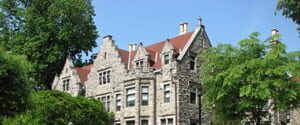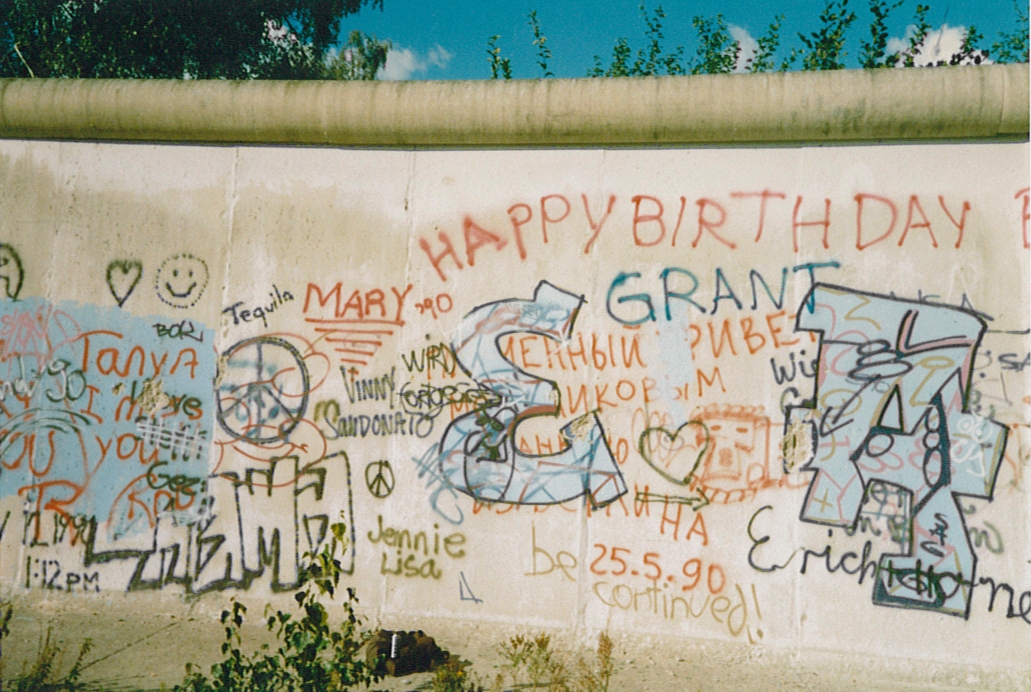East Berliners had their advantages as well as their troubles. Now, they have ours.
a version of this article appeared in The Philadelphia Inquirer, November 12th, 2009
Nineteen years ago the most unusual birthday card I have ever received arrived by airmail (not e-mail). On the front was a photograph of a 20-foot section of the Berlin Wall, taken just hours before the bulldozers arrived to knock it down.
I opened the card, read the nice note from the friends who had sent it to me, and turned back to the cover. A chaotic jumble of graffiti decorated the gray concrete surface. As I tried to decipher the various fragments of political and personal messages left over the years, the English words “Happy Birthday Grant!” suddenly jumped out at me. One of my friends’ children had stood on the other’s shoulders to reach a clear spot and spray-paint a birthday greeting.
graffiti decorated the gray concrete surface. As I tried to decipher the various fragments of political and personal messages left over the years, the English words “Happy Birthday Grant!” suddenly jumped out at me. One of my friends’ children had stood on the other’s shoulders to reach a clear spot and spray-paint a birthday greeting.
For part of the year or so I lived in West Berlin, in the mid-1980s, I had stayed with this family from the southern part of the city, near the wall. In their residential neighborhood, a strip of cleared land hugged the barrier on the western side, and over the years the space had become a narrow park, filled in with trees, bushes, and paths. Some days, we walked the dog along it, and East German soldiers watched us from their guard towers as we passed. We often talked about politics, the Cold War, and what the future might hold for Germany and the rest of the world.
Through a couple of checkpoints, one could cross into East Berlin. Most travelers were issued day visas only: Be back at the border by midnight, or else. I never knew exactly what the “or else” would be, and I didn’t want to find out.
Grayer and poorer than the western part of the city, intimidating and sometimes depressing, East Berlin still had much to offer. Stalin had made sure the great museums and theaters, the opera house, and other architectural monuments stood on that side. So did the rare opportunity to visit a communist country.
The opening of the wall, and the subsequent collapse of the Soviet Union, represented an astounding victory of freedom over oppression, of capitalism over communism. Yet, for all its profound limitations, life arguably had its advantages for those forced to live on the eastern side of the city.
A few times, rounding a corner in East Berlin as I hurried back to the checkpoint late at night, I practically tripped over little old ladies. Not one of them jumped in fear or clutched her handbag. The streets of East Berlin could be traversed safely at any hour of the day or night, though to be fair, in comparison to Philadelphia both sides of the city seemed crime free to me.
Muggings and carjackings were unknown. Schoolyards on the eastern side of the wall may have been dirt lots with hardly a swing in sight, but, on the other hand, no one would approach the children playing there and try to sell them drugs. Ever.
Virtually anyone who wanted a job could have one; there was no unemployment. Salaries varied little across the professions: teachers, waiters, doctors, factory workers, managers, and mechanics all earned similar pay. And most of them had savings, even though their pensions were guaranteed by the government.
People learned to be patient, to wait. Delayed gratification was the norm. Ten years – truly, a decade – might elapse between an order for a new car and its arrival. Not a plus, you might say, but neither is drowning in credit card debt.
As is so often the case, the government claimed responsibility for these aspects of East German society, though they were mostly unintended consequences of less benign policies.
The streets were safe partly because almost half a million Russian troops occupied a country the size of Colorado. And stealing money made no sense when there was little to buy beyond the essentials.
East Germany had no drug problem not because it was a Marxist utopia in which no one felt the need to get high. There was simply no way to pay for drugs. East German currency was worthless in the West, and drug traffickers want money they can spend.
Of course, the domestically produced and readily available drug, alcohol, was widely abused, and its ill effects were studiously ignored by the government, as far as I could tell.
Friends from East Berlin celebrated joyously when the wall fell, but they also worried about how their children would fare as citizens of the freewheeling West. In fact, the reunification has brought extraordinary opportunities and benefits to the East, and also, in places, more dangerous streets, drug problems, and unemployment.
Several years after the wall came down, one of those friends from the East made a comment that stuck with me in a letter about the reunification. “Now we have other chains,” she wrote. Millions of Americans, struggling to make mortgage payments on houses that are no longer worth what they paid for them, might agree.


Very interesting commentary. Your efforts to bring some parity to the burdens of those in a free society versus those in an enslaved one seem to be torturous. You seem not to think much of the freedoms we are blessed with in America.I don’t recall in those cold war days any one being shot while trying to climb over the wall into East Berlin. The”or else” in your story regarding what would happen to you if you failed to honor your day visa was that the communist authorites would reckon that you liked it so much there that they would make you a citizen. And then of course you would be shot trying to leave.
Dear Louis –
Thank you for the comment.
I’m afraid as a German speaking American alone in East Berlin, had I missed the midnight deadline, I would not been treated as a friend.
The time I spent in East Germany gave me greater appreciation than I had ever had for the freedoms I enjoyed as an American.
What struck me most was that living under communist dictatorship, as in all other systems, seemed to bring out the worst in some and the best in others.
I am one of those who escaped from East Germany way before the wall fell (1977), not via the wall, but in the trunk of a car.
On Nov.9th, 1989, I cried, like many others. The division of the two Germanies had been a central part of my life, probably the most central one after my family. And, all of a sudden, it was gone, the rules that had governed and profoundly influenced my life, was gone.
I appreciate you portraying a bit of “the other side” in your article. After our escape, I was struck by the immense cultural differences, and, especially, the me-for-myself attitude” of the Westerners. I missed the comraderie of the East, and I miss it even more in America. Granted, a lot of it was forced by the need for each other under serious circumstances. But it was comforting nonetheless.
Pia –
Thank you for the comment.
I talked to all of the students in our upper school last friday about the 20th anniversary of the opening of the wall.
I mentioned the 5000 or so people who had managed to escape during the 25 plus years the border was sealed. How nice to hear from one of them. Glad you made it.
As an American visitor to the East I was shocked by the limitations on people’s lives imposed by the communist dictatorship and impressed by how some people responded to that pressure by finding ways to resist and by cultivating deeper relationships with those they could trust.